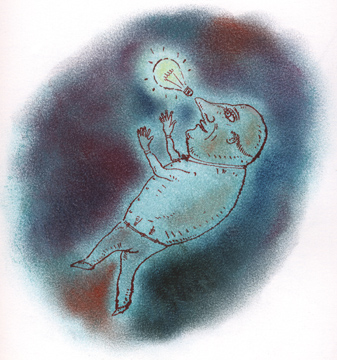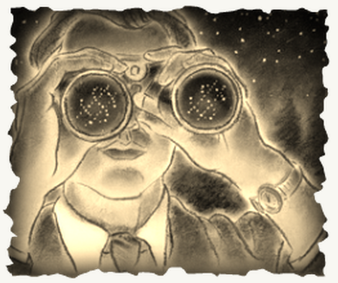|
2/10/2015 0 Comments ExternalizingOften, in trying to understand our own dreams, we will look at the dream content and connect it to events in the day(s) previous to the dream. Indeed dreams often draw from the events of the day or days before the dream, and people and parts of events will sometimes appear in the dream. Then one is tempted to say "I know what this dream is about!" and recount those daytime events.
However, this doesn't get to what is occurring internally for the dreamer, and that is the important part. Externalizing a dream by only relating it to events from waking life (hinted at in the dream) can be a way to trivialize the dreams importance, and resist looking inside (your heart, feelings, thoughts, for wishes or conflicts...) which is where real self-discovery begins. So why do dreams bring in events or images from our daily life? It may be that what occurs during the day, brings up in our minds conflicts or inner issues. The event isn't the important thing then, but the response to it inside ourselves. Getting at the inner issue is the important goal, and can be quite a bit more significant than that bit of outer life that triggered it.
0 Comments
 Your associations to the dream can be the key to understanding it. Associations are whatever comes spontaneously to mind about the dream in general or any part of the dream, and should be examined separate from the dream content itself. Associations should not be "thought out" too much. They are, rather, spontaneous thoughts that come to mind and are triggered by the dream or its contents. Associations don't need to make sense!! And they often do not seem to make sense. That is all to the good really, because you are then tapping into your unconscious processes and adding vital information about the dream's message or meaning. Your conscious thoughts or analysis, on the other hand, may only help to defend against the dream's meaning. This is why it is so helpful to talk to someone else about your dreams. An outside, objective perspective is often just what is needed to help unlock the dream's meaning. It takes some practice sometimes to freely associate to a dream. We are so programmed in school and in life to "make sense", be "rational", and "look good" in the presence of others. And we are dealing with some sensitive stuff in our dreams! Its worth the effort of getting past the initial (or on-going) discomfort or anxiety of it all. And it can be fun sometimes as well! 2/10/2015 0 Comments But I Don't Dream! Well, very likely you do dream, but aren't remembering them. Now some people sleep so poorly that REM sleep is constantly being interrupted, but this is really not common. Dreaming seems to be a very necessary part of our daily lives actually. Its healthy, normal, and probably necessary for our mental health. How much more healthy if we paid attention to our dreams and understand them! But we have to notice them and remember them first. Sometimes that means overcoming some biases and resistances. For example: dreams are "crazy" and a waste of time; they are scary; they can make me feel things I don't want to feel- and so on. Its true dreams don't follow the rules of the waking world we think of as "sane" and "normal". Dreams will put very odd things together sometime! And this can be disturbing! Its important to just accept dreams as they are and not judge them or yourself for dreaming such unique creations. Dreams work mainly with images. The expression "a picture is worth a thousand words" comes into play here. One image, lets say a red hat, in the context of a dream can mean A WHOLE LOT if you start to consider it in the context of the dream. Who is wearing it? is it oversized? is it shabby or new? is it like the hat Aunt Mary wore? and a whole cascade of meaning can come from all this (see Associations). But in general, dreams deal in symbolic images and what is literally happening in the dream (referred to as the "manifest content") (that crazy stuff!) can make a whole lot of sense and have profound meaning when its work through. ________________________________________ We seem to go through different levels of dreams through the night: the late night dreams are sometimes more "cryptic" to us and working at a deeper level of consciousness while dreams close to morning can be closer to daily life issues and more easily accessible. Dreams can also come in series, or continue through the night like an ongoing play. As we pay attention to dreams they can change over time- in a sense they respond to our increasing understanding through dream work. A useful habit is to keep a pad of paper next to the bed and without getting up, just write the dream as you lay there. Often as you start to write a dream you may begin to remember more details and even whole sections of the dream that you didn't recall right upon waking. Sometimes its best to just start writing what you remember and go from there. Of course it helps to indicate "this section came at the start" if it is written out of sequence. I've been told it can help to go to bed with the intension to remember your dreams in the morning. 2/10/2015 1 Comment What are Dreams Anyway? As mentioned in my Dream Work section, dreams are sometimes dismissed by some scientists as the random firing of cells in the brain during REM sleep. I frankly think this kind of assessment comes from the fear dreams can engender due to their being "irrational", chaotic, and by bringing to the fore ideas and behaviors that are completely unacceptable to the dreamer. That dreams really do have meaning is defended against by those who don't care to know about those meanings. But what is this meaning? Why is it so oddly presented and why can't dreams just present its meaning directly in the language we all are used to and can readily understand? Some of the reasons for this depend on the theory one subscribes to. A certain leap of faith may be required, at least initially. As one works with their dreams over time, it becomes unmistakable that dreams are not random or meaningless. It becomes all too obvious your mind is still very much at work in the service of processes that are psychological, and when dealt with carefully, can be very beneficial to our overall mental health: the broadening of our understanding, and expanding of psychological freedom and agency. As for why dreams are so odd and hard to cipher, that it a difficult question. In theory, when we dream the "guards" which defend against unacceptable thoughts and impulses are asleep on the job! During the waking state, we are well defended against what has perhaps long ago been deemed "unacceptable", and we keep such thoughts out of our conscious mind. Unacceptable thoughts tend to produce anxiety, seem "wrong" and scary. Keeping these sorts of ideas away from our conscious mind doesn't mean they don't still exist within us however. Such banished ideas reside in the unconscious where they are often not content to be! At night, with the guard asleep, these ideas in the unconscious start to come into play in dreams, but still not in a completely plain and obvious manner. Our mind will hide the unacceptable content even if the feelings are felt during the dream: guilt, aggression, lust, fear, etc. The feelings can also be very pleasant such as erotic excitement- maybe a guilty erotic pleasure we don't want to admit we yearn to experience. These issues can be subtle or like a sledgehammer- but something about the content is usually unacceptable to us, and thus comes out in a partially hidden/blocked form. The mind naturally expresses itself during dreaming with images rather than language and thoughts. So, as we look at and try to understand our dreams, we need to get comfortable with the symbolic language of that world within our mind. As we come to appreciate this magnificent language, we will find it can express a tremendous and profound message with just a simple, short dream. More on this in the next entry... 2/10/2015 2 Comments DreamBlog: IntroductionThis blog is for those interested in venturing into the realm of dream analysis and possibly submitting dreams for comments by myself and others.Dreams have a lot to teach us about ourselves and the working of the mind in general. I've noticed a lot of people have at least a passing interest in their dreams, while others have followed their dreams for years. In my work analyzing dreams, I understand them as a profound way to go deeply into the workings of the mind; the connections your mind has made between your feelings, thoughts, life history, significant others, hopes and dreams for the future, conflicts, and your wishes and fantasy life. In what other way can all this rich mental activity be accessed so directly!? No therapist or anyone else put those dreams in your head, so its definitely your mind at work- its customized and individualized YOU! Any discussion of dreams, what they are and what they mean, is bound to bring up strong feelings, disagreements, opinions, debate, denunciations, and praise/ridicule. This blog is an accumulation of the thoughts and understandings of many bright thinkers and analysts from Freud to current practitioners. This overview of my understanding of dreams is not meant to be complete nor scholarly. Nothing in this blog is meant to be construed as diagnosis, treatment, or psychotherapy. Working with a qualified therapist is advised for diagnosis and treatment of psychological problems and symptoms. |
AuthorJames Staunton, MFT has worked with dreams for over 20 years, both from a Jungian and Psychoanalytic perspective. ArchivesCategories |


 RSS Feed
RSS Feed